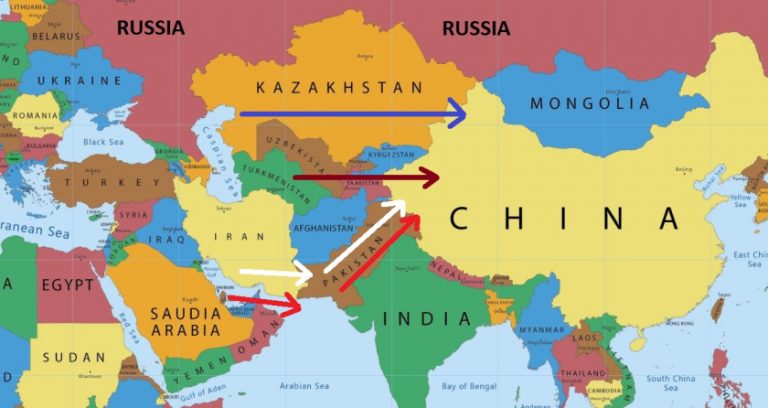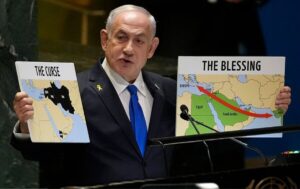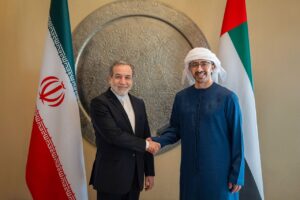China’s Priorities and Objectives in the Middle East
A conversation with Dr. Javad Mansouri
Iran’s former ambassador to China
China is a growing power that is added to the depth of its interests in different parts of the world. One of the areas that have extensive relations with China, is the Middle East. From the past, the region, with its rich energy resources and strategic location, has been the playground of great powers and many regional actors with a lot of complexity. This talk has tried to assess China’s political, economic, and security interests in the Middle East.
IIWFS: What are the priorities and objectives of China in West Asia and the Middle East?
West Asia is a great opportunity for big countries and big global producers due to its geographically-historic location and its vast wealth, as well as its vast markets. For this reason, the presence, influence and domination of the region over the last two centuries have been a matter for great powers, and they have launched wars in the region to have their maximum interests in it. What we see today is in line with this policy; the great powers are not sympathetic to the Jews to create an independent state called Israel, and are not with Wahhabism to support the Saudi government, but they are moving precisely in this direction in order to secure their interests from the markets of this region and raw materials, especially oil and gas. For this reason, it is believed that this region will experience some kind of instability for a long time. But at the same time major powers trying to be involved as much as possible in this area and earn their own interests. Meanwhile, China in the West Asia region, firstly, seeks to supply its energy. Because the Middle East is one of the areas where oil and gas are abundant and China is heavily dependent on these resources. Secondly, the political developments in this region are such that the presence or absence of governments can provide them with an opportunity in other parts of the world. Thirdly, there are naturally major markets in China that, in order to obtain their own interests, prefers to be in a position to maximize their benefits. So over the past two decades, China’s presence in the markets of this region has grown significantly.
IIWFS: In the current situation, in China’s view of West Asia, what is the priority of its relationship with actors such as Egypt and Saudi Arabia, Iran, etc.?
The Chinese government usually tries to deal with powerful states in order to secure its own interests and avoid of being under the pressure of its rivals. They follow this policy seriously, and somehow they follow the slogan “We are all friends until they are friends with us.” As you can see, China has an active relationship with Palestine and Syria and other countries, while maintaining the same relationship with Israel, and exchanges views with these governments. China’s policy does not mean that if it has relationship with Israel, it means breaking the relationship with Palestine, Syria and Iraq. China also has relationship with North and South Korea. Even in recent years, China has also rebuilt its relations with Taiwan, and is therefore pursuing the theme of “a country and two systems.” This is the approach that Taiwan is from China, but Taipei is allowed to whatever it wants to do inside.
IIWFS: What are the goals of China in view of Israel, given the sensitivity of the actors of the region?
At present, the government of China is seeking material, economic and ideological power. Therefore, China is pursuing the “peace and constructive empire” slogan to achieve an economic, military and political power. At that point, there may be different encounters with countries; but until then, he tries to have some sort of balance. Even when the US government makes caustic manifest declarations to China on human rights, the government of China responds very calmly that The US government should have a human rights study in the United States and report it. That is, China is not much challenged on human rights reports with the US; so it tries to increase relations with Israel to the extent possible. China, in the same vein, has the best relations with all African countries, regardless of religious, political, and frontier issues. China’s activities and relations with Africa are so widespread that Europeans and Americans are jealous of them.
IIWFS: In terms of security and geopolitics, what are China’s goals in the seas and region of West Asian?
Given the size of the territory and the high population, the government of China has more potential than it already possesses and can stabilize its presence in all sensitive parts of the world by turning this potential force into actual force. To this end, it extends its relations with all geopolitical regions in order to exploit territorial situations in the direction of developing its political influence. The China tries to cooperate and maintain friendly relations with countries like Egypt, North Africa, South Africa, in order to take advantage of the economic and political potential of these countries.
IIWFS: What is China’s approach to crises like Iraq and Salafist groups, and so on? And what is its security priorities in this area?
Takfiris and terrorist groups are naturally hated by the Chinese government, because security is indispensable for economic activity and is threatened by the existence of these groups. Secondly, these groups cannot create stable states for a long period of time, so that China can interact with them constructively and for a long time; so for these reasons, China not only does not welcome these groups, it even prefers moderate currents.
IIWFS: To what extent domestic security concerns increase the likelihood of China’s growing role in Middle East developments?
The United States and some European countries are trying to create problems for the government of China; including intensifying dissatisfaction in Tibet, Xinjiang and some other states with separatist slogans, speeches against China in international communities on human rights. The government of China is fully aware of this problem and has strongly stood against it. It has also done a lot in the Interior areas and has changed the face of these areas. Therefore, China will conflict and will definitely stop the currents that want to be directed somehow from abroad, or want to do something against China’s sovereignty and territorial integrity, or want to threaten China’s economic interests.
** This article is originally published in Persian and translated by A.R. Mirjomehri.





